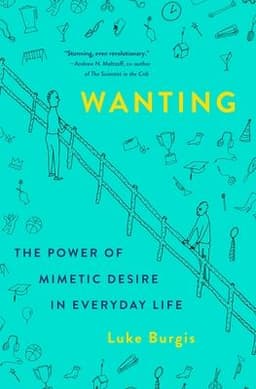
Wanting by Luke Burgis - 1 Minute Summary
The Power of Mimetic Desire in Everyday Life
Book by Luke Burgis
Read the In-Depth 15 Minute Summary
The Secret Force That Shapes Our Lives: Understanding Mimetic Desire
Have you ever wondered why you want the things you want? In his thought-provoking book "Wanting," Luke Burgis argues that our desires are rarely our own. Instead, they are often shaped by a powerful force called mimetic desire - our innate tendency to imitate the desires of others. Drawing on the groundbreaking theories of French polymath René Girard, Burgis shows how this hidden mechanism influences human behavior in every domain of life, from personal relationships to professional ambitions to societal trends.
At its core, mimetic desire is the unconscious inclination to want what others want, simply because they want it. Rather than desiring objects or experiences for their intrinsic qualities, we often desire them because we see them being desired by others, especially those we admire or view as rivals. This means that our desires are not autonomous, but rather profoundly social and interdependent. We are constantly looking to others to learn what is worth wanting. Girard called these influential others "models of desire." They shape our wishes without us even realizing it.
Burgis argues that mimetic desire is like gravity - an inescapable force that can pull us in positive or negative directions. On one hand, imitation is the foundation of all human learning and culture. It allows us to adopt the beneficial desires modeled by parents, teachers, and mentors. However, mimetic desire also breeds envy, rivalry, and conflict. When we want the same non-shareable things as our neighbors - say, status at the office or the affections of a romantic partner - we become trapped in a destructive game of one-upmanship. Burgis shows how these dynamics fuel everything from keeping up with the Joneses to corporate power struggles to political polarization.
So what can we do to escape the pitfalls of mimetic desire? Burgis offers several powerful strategies. First, identify your mimetic models - the people you habitually look to for cues about what to want. Notice how your desires shift in their presence. Second, distinguish between thin desires, which are mimetic and often unsatisfying, and thick desires, which reflect your authentic values and lead to sustainable fulfillment. Third, when you notice yourself falling into a mimetic rivalry, look for ways to redirect that competitive energy in a more generative direction. Finally, as a leader, strive to model transcendent desires that lift others out of petty competitions and unite them around higher goals.
Ultimately, the antidote to negative mimesis is self-awareness combined with empathy. By understanding how you are influenced by others' desires, you can take back authorship of your own wants. And by recognizing the hidden desires driving others' behavior, you can defuse conflicts and find common ground. In an age of cutthroat competition and blind conformity, Burgis's book is a welcome invitation to break free from the mold and discover a freer, more authentic way of living. It all starts with taking a clear-eyed look at the secret force shaping our lives - and deciding what we truly want.
Related Content


Wanting Book Summary
Luke Burgis
In "Wanting," Luke Burgis draws on the powerful insights of French polymath René Girard to explore how mimetic desire - our tendency to unconsciously imitate the desires of others - shapes our lives, and provides practical strategies to escape toxic rivalries, find fulfilling desires, and become authentic leaders in an age of runaway mimesis.
In "Wanting," Luke Burgis draws on the powerful insights of French polymath René Girard to explore how mimetic desire - our tendency to unconsciously imitate the desires of others - shapes our lives, and provides practical strategies to escape toxic rivalries, find fulfilling desires, and become authentic leaders in an age of runaway mimesis.
Sociology
Psychology
Personal Development
Human Behavior

